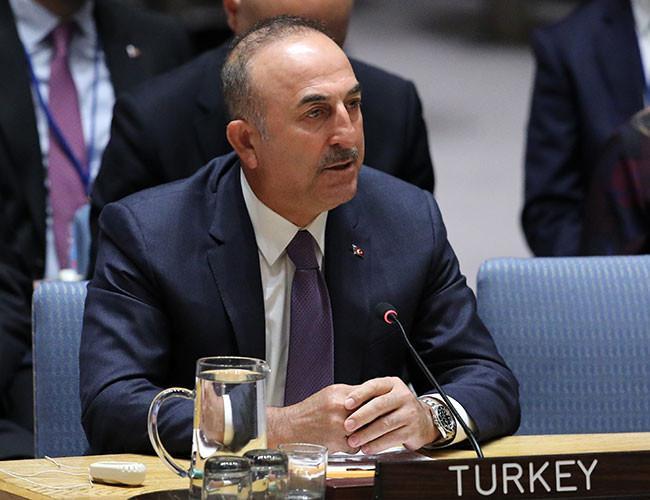
The "divisive language" used by some European politicians is “a very dangerous game” that helps fuel the rise of extremism in Western Europe, Turkish Foreign Minister Mevlüt Çavuşoğlu said on April 23 in New York.
“We, the decision-makers and the politicians, have important responsibilities. One of the reasons for the rise of extremism in Western Europe particularly is the divisive language used by some politicians,” Turkey’s top diplomat said at a high-level meeting of the U.N. Security Council on building and sustaining peace.
“This approach divides people along ethnic and religious lines. This is a very dangerous game,” he said.
Urging politicians to refrain from creating stereotypes, he said everyone must convey positive and unifying messages to the world.
Young people around the world are being targeted by radical, extremist and terrorist ideologies, Çavuşoğlu said.
“Terrorist groups such as ISIL (Islamic State of Iraq and the Levant), Al-Qaida, PKK (Kurdistan Workers’ Party), YPG (People’s Protection Units) and FETÖ (Fethullahist Terrorist Organization) continue to recruit women, children and youth. We must stop this. What we need is a holistic approach,” he noted, saying that radicalization and violent extremism are not limited to one particular religion, faith or community.
“This is our common challenge, and we need to face it together. Security Council Resolution 2250 is proof of the crucial role of youth in [contributing to] peace and security, and the new resolution to be adopted should provide further guidance,” he said.
“We can also use the potential of existing mechanisms such as the [UN] Alliance of Civilizations [UNAOC], and Spain and Turkey are trying to re-energize this initiative, and we need it more than ever. We also need to create interaction between national, regional and global measures. Good practices and lessons learned in one part of the world can be employed globally. This is why we need to expand the U.N.’s capabilities to support member states, and we will continue to contribute to all efforts aimed at empowering the youth,” he said.
Turkey has developed “tailor-made government structures and policies” to address the needs of its young generation, which correspond to half of the total population, as well as nearly a million Syrian youth being hosted within its borders, Çavuşoğlu noted.
Additionally, he said the age barrier for the young population has been lowered in order to help them join politics and take part in decision-making processes.
“We promote role models, social integration and rehabilitation programs. Education is also a key factor, and we leave no one behind and provide equal opportunities for all. We also promote dialogue among youths from different backgrounds,” he said, adding that all the efforts are made to achieve sustainable development goals.
Çavuşoğlu arrived in New York on April 22 to address the U.N. General Assembly on Turkey’s contributions and approach to U.N. efforts to build and sustain peace. He is also set to meet with U.N. Secretary-General Antonio Guterres, hold bilateral meetings with his counterparts on the meeting’s sidelines and speak with Turkish and U.S. media outlets.